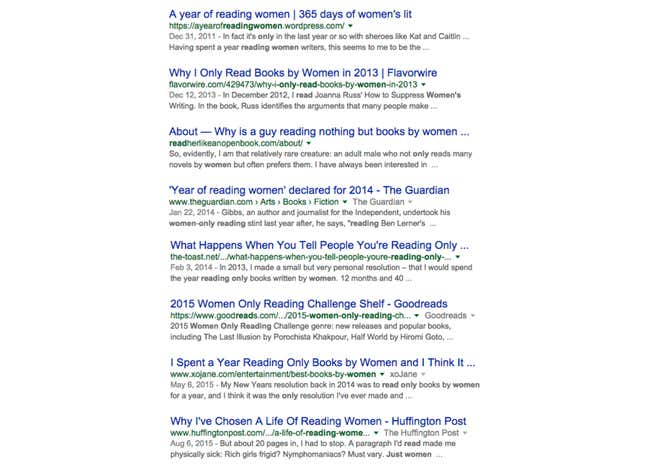
A new year has dawned, and with it, new resolutions, and with that, new opportunities to perform things that are often made inert through over-performance—things like confidence, or sexual appeal, or diligence, or good intentions, particularly of the “ally” kind.
Specifically, as a new slate of forthcoming books emerges before us, it may be tempting to announce publicly, and perhaps at length, that you will be personally doing your part to counter the very real, very bad hegemony enshrined in the literary marketplace by reading Only Women or Only People of Color or Only People Who Are Not White Straight Cis Men in 2016. That’s a great idea! I have one additional suggestion: shut up.
On its own, the curve away from reading white male authors is extremely rewarding. And, as with pretty much everything that is rewarding in its own right—good sex, thoughtful cooking, giving your money away, spiritual practice (?), fitness (??), children (????)—the nature of the reward skews inherently private, evident only in its natural effects.
In other words, I get why you’d avoid reading 10:04 or what have you; I don’t understand why it’s ever more productive to say so than just to read something else and (omitting the part about your commitment to social justice) talk about that. Justification for obviously rewarding acts is always unnecessary, and in the case of reading “diverse” writers, the reward can be meaningfully deflated by the announcement of the act itself. The people most excited to say, “Uh, I’ve actually been reading a lot of Nigerian writers lately?” tend to be white people; the space taken up by being interested in one’s own Here’s Why I’m Only Reading X Minority Group project is often counterproductive to the point.
It’s easy for good ideas to get blurry, particularly when you factor in the internet, which allows people to huff good ideas over and over while looking in a mirror. So—to the good idea in question. The Year of Non-Supremacist Reading is pinned on true observations. The literary world is dominated by white writers and white voices, and to some degree, it’s a zero-sum game. There is only so much space on a bestseller list. In 2011, as documented by Roxane Gay, 655 out of 742 of the books featured in the New York Times book review section were written by white people; as recently as last summer, the Times released a reading list that was—remarkably—completely white.
Bookish social media provides a little more breathing room, but the idea of My Year of Only Reading Kill All Men is predicated on these same ideas: that (1) there is limited space and attention in the world of literary fiction and (2) the work of good, non-white, non-male writers occupies too little of it.
And so, given this premise, it seems baffling for anyone to devote space to their decisions vis-a-vis their reading rather than writers’ decisions vis-a-vis that work.
But the whole point of the stunt is highlighting that diverse work! you could say. It is, in intention—but, you know, look at the tone on Twitter when people write about “not reading white authors” or “not reading white men,” or check out any of the hundreds of blog posts that land closer to “look how I good I am as a reader” than “look how well these people write.”

Many of these posts were prompted by Lilit Marcus, whose writing on the topic was as lovely and instinctively generous as most of the follow-ups were not. She tried a year of reading only women as a personal experiment at the start of 2013; it went well, and closed with a realization that she detailed in an end-of-year piece at Flavorwire. The year, she wrote, felt “completely, utterly ordinary. I don’t feel like I was missing anything. I didn’t feel deprived.”
It’s true that deprivation is not one of the outcomes of an Only Reading year: you could spend a year reading any narrow category of author and you’d feel like your world got bigger, as long as those books were good. But inflation—self-inflation, at the indirect expense of the writers whose work is supposed to be your focus—is a side effect more often than not.
Take this recently published “Reader’s Manifesto for 2016: Resolutions from a Straight, White Male” at LitHub: it is 775 words by a white man on the topic of why white male voices should be softer, and it includes this penultimate paragraph:
In 2016, I vow everything, and promise nothing. Because I too stumble and stutter and stop, because I too am sometimes too cowardly for plain truth, because my abstract courage can dissipate in times when it’s most needed, and because I too have more to learn now than I ever have—because, in other words, I am a person, and on my own I’m not worth all that much. But the best way to combat these lesser parts of me is, of course, more exposure to diverse voices, to contrary beliefs, and to the savagery of history.
Here’s another example, from K.T. Bradford’s xoJane piece from last February, entitled “I Challenge You to Stop Reading White, Straight, Cis, Male Authors for One Year.”
Whichever focus you choose, it will change the way you read and the way you go about picking things to read. When I settle in to read a magazine now, I read in order of stories I think I’ll like best. And if I do decide to read one by a new-to-me author who appears to be a straight, white, cis male, it’s usually because I trust the editor and the magazine. My reading sessions are filled with much less stress these days.
If only it were possible to do something good and rewarding without publicly prioritizing what effect that act has on you.
I think that these pieces, now, at the dawn of 2016, are dead in the water. I have yet to read a single one that does not arrive at and nearly reinforce the same conclusions that prompted it. We know that white male writers take up too much literary attention; the solution is not necessarily jamming everyone else into a bottle of social justice cough syrup, standing on a soap box, and gulping it all down.
Publicly announced diverse reading years seem akin to corporate diversity policies—showy and superficial fixes for deep problems, full of effort and essentialism that tends to only make things worse. Furthermore, the Specialized Reading Year may actually chip away at the promise of the better future we’re looking for—one in which certain writers are no longer seen as inherently special-interest, in which minority/women writers will no longer seen as writing about Identity when white/male writers get to write about Life.
And on that better future: if the Year of Reading Wokely is supposed to model a behavior that should be normalized—reading from a wide range of experiences, valuing what is under-represented—we might do well to understand that it’s already well within our power to normalize that behavior, which would not mean extensively discussing our reading habits or restricting them for self-improvement, but just purchasing, consuming, talking about the work.
We can do that. We already do that. We do not need essays about what reading a certain way taught us about prejudice (“it exists, and is realer than I could have imagined when I started”); we do not need writers who need no qualifications jammed over and over into “20 People of Color You Must Read in 2016.”
In these essays and on these lists, you’ll often find Americanah and Chimamanda Ngozi Adichie and her quote about “the danger of a single story” from that great, now-famous TED Talk. Adichie said:
The consequence of the single story is this: It robs people of dignity. It makes our recognition of our equal humanity difficult. It emphasizes how we are different rather than how we are similar.
The “I’m Only Reading No White Men For a Year” proclamations are starting to sound a bit much like this single story: the emphasis on difference, the boundaries reinforced rather than dissolved. If you were a queer writer, or a woman of color writer, would you want someone to read you because they thought they were doing something dutiful about power structures? Or because they gravitated to you, not out of any sense that you would teach them something about diversity that they could then write about in a year-end essay—but that they just read you because you were good?
Contact the author at [email protected].
Illustration by Tara Jacoby